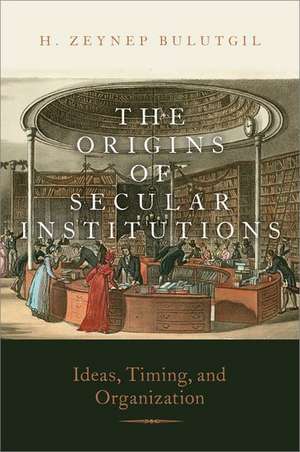The Origins of Secular Institutions: Ideas, Timing, and Organization
Autor H. Zeynep Bulutgilen Limba Engleză Paperback – 3 mai 2022
Preț: 164.15 lei
Preț vechi: 188.45 lei
-13% Nou
Puncte Express: 246
Preț estimativ în valută:
31.43€ • 32.79$ • 26.34£
31.43€ • 32.79$ • 26.34£
Carte disponibilă
Livrare economică 08-14 februarie
Preluare comenzi: 021 569.72.76
Specificații
ISBN-13: 9780197598450
ISBN-10: 0197598455
Pagini: 272
Dimensiuni: 235 x 157 x 19 mm
Greutate: 0.41 kg
Editura: Oxford University Press
Colecția OUP USA
Locul publicării:New York, United States
ISBN-10: 0197598455
Pagini: 272
Dimensiuni: 235 x 157 x 19 mm
Greutate: 0.41 kg
Editura: Oxford University Press
Colecția OUP USA
Locul publicării:New York, United States
Recenzii
Why do secularizing groups emerge? And when do these advocates of secular institutions and religious tolerance succeed? In this innovative and compelling analysis, Zeynep Bulutgil points to print technology, the diffusion of secularist ideas, and their grafting onto political party organizations as critical to the emergence of secularized institutions. This is a must read for scholars of religion and politics, state formation, and political parties." -Anna Grzymala-Busse, Michelle and Kevin Douglas Professor of International Studies, Stanford University
Bulutgil effectively explains the ideational and organizational mechanisms of success or failure of political secularization processes. Her combination of quantitative and comparative historical methods is impressive. Analyzing France, Spain, the United Kingdom, Turkey, Morocco, and Tunisia, she successfully elaborates the conditions under which secularist movements achieve to secularize state institutions. A major contribution to multiple fields, particularly religion and politics." -Ahmet T. Kuru, Professor of Political Science, San Diego State University
A tour de force of historical sociology and a major contribution to theories of state building. Drawing on new data and a breath-taking array of historical sources on civil society, church infrastructures, and timing and sequencing of reform, Bulutgil provides a new perspective on the origin of secular orders and challenges that secularisers face. Dazzling in its breadth, the author takes us through contexts as diverse as pre-Victorian, Victorian and twentieth century England, to the turbulence of revolutionary France, to Spain, Morocco, and Tunisia. The book is a fresh take on why some seculars succeed and others fail across nations and within the same country in different points in time. This book should be a must read for students of comparative politics, comparative historical analysis, sociology, and international relations." -Tomila Lankina, Professor of International Relations, London School of Economics and Political Science
Bulutgil effectively explains the ideational and organizational mechanisms of success or failure of political secularization processes. Her combination of quantitative and comparative historical methods is impressive. Analyzing France, Spain, the United Kingdom, Turkey, Morocco, and Tunisia, she successfully elaborates the conditions under which secularist movements achieve to secularize state institutions. A major contribution to multiple fields, particularly religion and politics." -Ahmet T. Kuru, Professor of Political Science, San Diego State University
A tour de force of historical sociology and a major contribution to theories of state building. Drawing on new data and a breath-taking array of historical sources on civil society, church infrastructures, and timing and sequencing of reform, Bulutgil provides a new perspective on the origin of secular orders and challenges that secularisers face. Dazzling in its breadth, the author takes us through contexts as diverse as pre-Victorian, Victorian and twentieth century England, to the turbulence of revolutionary France, to Spain, Morocco, and Tunisia. The book is a fresh take on why some seculars succeed and others fail across nations and within the same country in different points in time. This book should be a must read for students of comparative politics, comparative historical analysis, sociology, and international relations." -Tomila Lankina, Professor of International Relations, London School of Economics and Political Science
Notă biografică
H. Zeynep Bulutgil is an Associate Professor in the Department of Political Science at University College London. She is also the author of The Roots of Ethnic Cleansing in Europe (2016).
